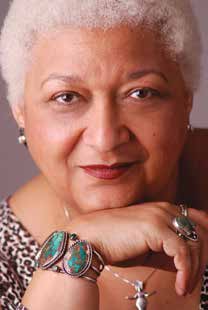
By Jewelle Gomez–
A lot of attention has been showered on the film Barbie, and deservedly so. It’s a lot like its director Greta Gerwig: smart, funny, and feminist. I’ve thought a lot about how the fire of the speech given by America Ferrera’s character lit up the movie audience. I hoped someone was writing it down … someone was, to share it with those who didn’t see the movie so we can remember revolution: http://tinyurl.com/2s48ubmc
But the thing is, we keep getting this message about how contradictory demands make it “literally impossible to be a woman” and each generation forgets once we’ve washed the popcorn butter from our hands.

In 1992, I reviewed the film Buffy the Vampire Slayer, directed by Fran Rubel Kuzui. More than thirty years ago I was surprised to see that message front in center in the teen/action/comedy/thriller starring the underrated Kristy Swanson. It even sparked a successful television series that didn’t totally cop out on the premise. Still, the importance of empowering young women always seems like a surprise when it pops up.
Staying in a hotel recently, I rewatched Buffy and remembered how funny and powerful a director can make women when she tries. The bitchiness of teenagers—male and female—is biting and the sexualization of teen girls by adults (we know who picks cheerleader costumes) is blatant and repulsive even when you know the young women playing the teens are probably ten years older.

The story includes many of the traditions of teen movies: the outsider girl (Buffy) and biker boy (Pike, played by Luke Perry), and the queen bees on campus (led by Hilary Swank). Then it stirs in the mysterious elder played by Donald Sutherland, whose slyness makes a perfect counterpoint to Buffy’s innocence. In many ways, the story feels old fashioned, and that may have been the director’s intention.
The ultimate message, however, is one that always needs repeating. Females are, in fact, human beings—not objects, not dolls. When Pike sees Buffy decimate a gang of vamps he tells her, “You’re not like other girls.” However, her response is, “Yes, I am.” And therein lies the key to the feminist heart of the movie. Buffy has extraordinary talents and at the same time she is an ordinary teen girl. And any of her girlfriends might find some powers within themselves if they weren’t perpetually crushed.
Okay, what’s the queer (not just feminist) aspect to the movie? The late, beloved Paul Reubens, as a vampire, has an endless and hysterical death scene. And famed news woman Liz Smith (bisexual) makes a cameo appearance reporting the local catastrophe when the vamps overrun the high school prom. A teen who survived the attack screams when interviewed: “They were biting people. They were cold. They had this look in their eyes. I think they were young Republicans!”

The theme of the ill-fated senior prom is “Hug the World,” which might someday be possible when women break the stranglehold on our human rights. (See Spanish soccer star Jenni Hermoso’s response to an unwanted kiss from a male official.) Sometimes I like my polemics subtle; other times I like them hard core. As Buffy and Pike ride off into the sunset, we hear the song “Man Smart (Woman Smarter)” credited to King Radio. Viva hard core.
Jewelle Gomez is a lesbian/feminist activist, novelist, poet, and playwright. She’s written for “The Advocate,” “Ms. Magazine,” “Black Scholar,” “The San Francisco Chronicle,” “The New York Times,” and “The Village Voice.” Follow her on Instagram and Twitter @VampyreVamp
Leave Signs
Published on September 7, 2023









Recent Comments